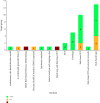The Application of Knowledge-Based Clinical Decision Support Systems to Enhance Adherence to Evidence-Based Medicine in Chronic Disease
- PMID: 37284487
- PMCID: PMC10241579
- DOI: 10.1155/2023/8550905
The Application of Knowledge-Based Clinical Decision Support Systems to Enhance Adherence to Evidence-Based Medicine in Chronic Disease
Abstract
Among the technology-based solutions, clinical decision support systems (CDSSs) have the ability to keep up with clinicians with the latest evidence in a smart way. Hence, the main objective of our study was to investigate the applicability and characteristics of CDSSs regarding chronic disease. The Web of Science, Scopus, OVID, and PubMed databases were searched using keywords from January 2000 to February 2023. The review was completed according to the Preferred Reporting Items for Systematic Reviews and Meta-Analyses checklist. Then, an analysis was done to determine the characteristics and applicability of CDSSs. The quality of the appraisal was assessed using the Mixed Methods Appraisal Tool checklist (MMAT). A systematic database search yielded 206 citations. Eventually, 38 articles from sixteen countries met the inclusion criteria and were accepted for final analysis. The main approaches of all studies can be classified into adherence to evidence-based medicine (84.2%), early and accurate diagnosis (81.6%), identifying high-risk patients (50%), preventing medical errors (47.4%), providing up-to-date information to healthcare providers (36.8%), providing patient care remotely (21.1%), and standardizing care (71.1%). The most common features among the knowledge-based CDSSs included providing guidance and advice for physicians (92.11%), generating patient-specific recommendations (84.21%), integrating into electronic medical records (60.53%), and using alerts or reminders (60.53%). Among thirteen different methods to translate the knowledge of evidence into machine-interpretable knowledge, 34.21% of studies utilized the rule-based logic technique while 26.32% of studies used rule-based decision tree modeling. For CDSS development and translating knowledge, diverse methods and techniques were applied. Therefore, the development of a standard framework for the development of knowledge-based decision support systems should be considered by informaticians.
Copyright © 2023 Marsa Gholamzadeh et al.
Conflict of interest statement
The authors declare that they have no conflicts of interest.
Figures






References
-
- Hisham R., Ng C. J., Liew S. M., et al. Development and validation of the Evidence Based Medicine Questionnaire (EBMQ) to assess doctors’ knowledge, practice and barriers regarding the implementation of evidence-based medicine in primary care. BMC Family Practice . 2018;19(1) doi: 10.1186/s12875-018-0779-5. - DOI - PMC - PubMed
Publication types
MeSH terms
LinkOut - more resources
Full Text Sources
Miscellaneous

